I was interested in this question, so I did a test just now. Using .NET Framework 4.5.2 on an Intel(R) Core(TM) i3-2328M CPU @ 2.20GHz, 2200 Mhz, 2 Core(s) with 8GB ram running Microsoft Windows 7 Ultimate.
It looks like LINQ might be faster than for each loop. Here are the results I got:
Exists = True
Time = 174
Exists = True
Time = 149
It would be interesting if some of you could copy & paste this code in a console app and test as well.
Before testing with an object (Employee) I tried the same test with integers. LINQ was faster there as well.
public class Program
{
public class Employee
{
public int id;
public string name;
public string lastname;
public DateTime dateOfBirth;
public Employee(int id,string name,string lastname,DateTime dateOfBirth)
{
this.id = id;
this.name = name;
this.lastname = lastname;
this.dateOfBirth = dateOfBirth;
}
}
public static void Main() => StartObjTest();
#region object test
public static void StartObjTest()
{
List<Employee> items = new List<Employee>();
for (int i = 0; i < 10000000; i++)
{
items.Add(new Employee(i,"name" + i,"lastname" + i,DateTime.Today));
}
Test3(items, items.Count-100);
Test4(items, items.Count - 100);
Console.Read();
}
public static void Test3(List<Employee> items, int idToCheck)
{
Stopwatch s = new Stopwatch();
s.Start();
bool exists = false;
foreach (var item in items)
{
if (item.id == idToCheck)
{
exists = true;
break;
}
}
Console.WriteLine("Exists=" + exists);
Console.WriteLine("Time=" + s.ElapsedMilliseconds);
}
public static void Test4(List<Employee> items, int idToCheck)
{
Stopwatch s = new Stopwatch();
s.Start();
bool exists = items.Exists(e => e.id == idToCheck);
Console.WriteLine("Exists=" + exists);
Console.WriteLine("Time=" + s.ElapsedMilliseconds);
}
#endregion
#region int test
public static void StartIntTest()
{
List<int> items = new List<int>();
for (int i = 0; i < 10000000; i++)
{
items.Add(i);
}
Test1(items, -100);
Test2(items, -100);
Console.Read();
}
public static void Test1(List<int> items,int itemToCheck)
{
Stopwatch s = new Stopwatch();
s.Start();
bool exists = false;
foreach (var item in items)
{
if (item == itemToCheck)
{
exists = true;
break;
}
}
Console.WriteLine("Exists=" + exists);
Console.WriteLine("Time=" + s.ElapsedMilliseconds);
}
public static void Test2(List<int> items, int itemToCheck)
{
Stopwatch s = new Stopwatch();
s.Start();
bool exists = items.Contains(itemToCheck);
Console.WriteLine("Exists=" + exists);
Console.WriteLine("Time=" + s.ElapsedMilliseconds);
}
#endregion
}

